Adopting a vegan diet involves eliminating all animal products from one’s food consumption, including meat, dairy, eggs, and honey. This plant-based approach to eating is gaining popularity, not just as a dietary choice but also as a lifestyle change for health, ethical, and environmental reasons. A growing body of evidence supports the health benefits of a vegan diet, and many people who switch to veganism report positive changes in their overall well-being.

A vegan diet, rich in fruits, vegetables, legumes, nuts, and seeds, is known for being high in dietary fiber, vitamins, and phytonutrients — plant compounds that are beneficial to human health. While health improvements such as weight management and blood sugar control are often highlighted, it’s important to acknowledge that a vegan diet also requires careful planning to ensure all nutritional needs are met. This includes paying attention to essential nutrients typically abundant in animal products, such as vitamin B12, iron, calcium, and omega-3 fatty acids, which may require supplementation or a well-structured diet plan.
Key Takeaways
- A vegan diet excludes animal products and can offer various health benefits.
- Careful planning is essential to meet nutritional needs on a vegan diet.
- Vitamin B12, iron, calcium, and omega-3 fatty acids are nutrients to focus on for vegans.
Nutritional Advantages of a Vegan Diet
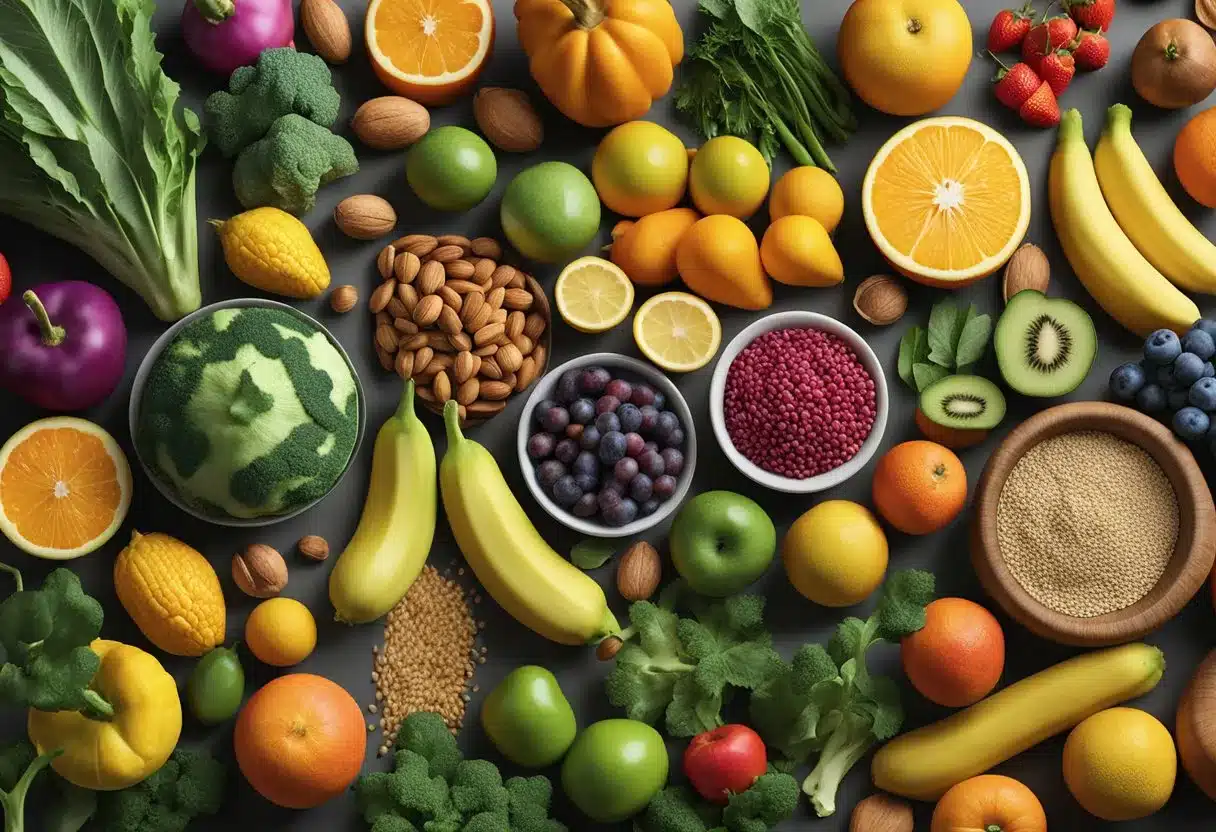
Transitioning to a vegan diet introduces a host of nutritional benefits linked to an increased intake of certain vitamins and minerals while promoting heart health and weight management.
Vitamins and Minerals
A vegan diet typically includes a variety of fruits, vegetables, nuts, and seeds, which are natural sources of essential nutrients. Vegan individuals need to ensure they consume enough vitamin B12, a crucial nutrient often found in animal products. Fortified plant-based milks and nutritional yeasts are good vegan sources of B12. Adequate vitamin D and calcium are also key for bone health, with fortified foods and sunlight exposure being primary sources of vitamin D, while leafy greens and tofu can provide calcium. Vegan diets are also rich in iron, though it’s the non-heme type, which is less readily absorbed, so pairing with vitamin C-rich foods can aid absorption. Zinc, magnesium, iodine, and selenium are found in nuts, seeds, and whole grains—all staples in a vegan diet.
Heart Health
Plant-based diets are naturally low in saturated fat and cholesterol, reducing risk factors for heart disease. A diet high in whole foods such as fruits, vegetables, and legumes contributes to lower cholesterol levels. Fiber present in plant-based foods also plays a role in heart health by helping to regulate blood pressure and reduce inflammation. Consistently following a well-planned vegan diet may lower the chances of developing heart disease by promoting a healthy lipid profile.
Weight Management
Whole foods in a vegan diet are typically lower in calories and fat, contributing to weight loss and weight management. High dietary fiber content not only supports digestive health but also can lead to a feeling of fullness, which helps in controlling calorie intake. Due to their low saturated fat content, whole plant foods can contribute to a balanced and nutritious diet that supports maintaining a healthy weight.
Health Benefits and Disease Prevention
Adopting a vegan diet can offer multiple health benefits and aid in the prevention of certain diseases. These advantages are rooted in an increase of nutrient-dense foods that are prominent in a vegan diet, such as fruits, vegetables, and whole grains, and a decrease in red meat consumption which is linked to health risks.
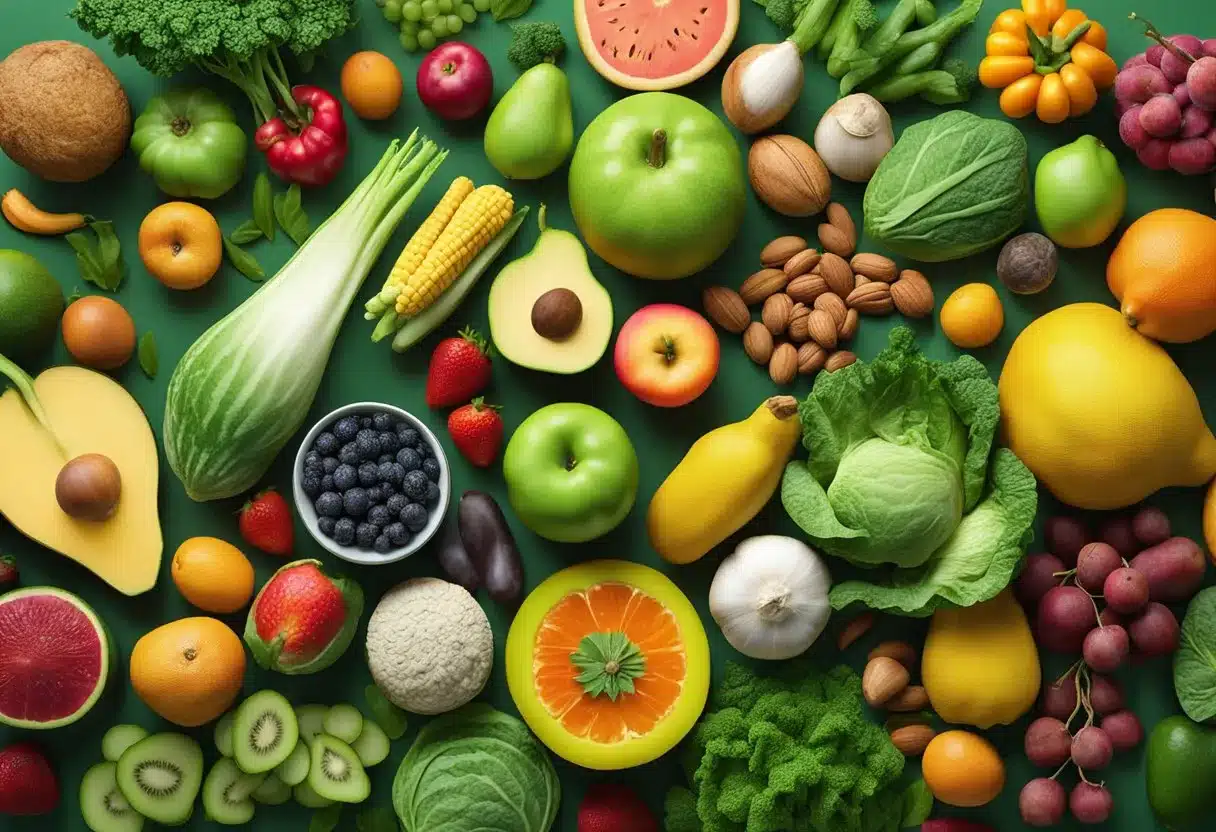
Reducing Cancer Risk
Evidence suggests that a diet high in fruits and vegetables may lower the incidence of various cancers. Particularly, the avoidance of red meat can be beneficial in reducing the risk of colorectal cancer.
Diabetes Management
A vegan diet rich in legumes, whole grains, and other whole foods can help manage diabetes by stabilizing blood sugar levels. These foods have a low glycemic index and are beneficial for those with type 2 diabetes.
Digestive Health
High fiber content in plants and whole grains supports digestive health. Beans and legumes contribute to this benefit, aiding in regular bowel movements and the maintenance of a healthy gut environment.
Bone Health
Calcium and vitamin D are essential for bone health. While these nutrients are often associated with dairy, many plant-based foods such as leafy greens, fortified plant milks, and seeds serve as excellent sources to support bone density.
Mental Well-Being
A plant-based diet can have a positive effect on mental health. Nutrient-dense foods can alleviate stress and improve mood, while the intake of antioxidants in fruits and vegetables fights inflammation linked to depression.
Longevity
Diets that are high in plant-based foods and lower in processed foods can contribute to longevity. Nuts, seeds, and whole grains, which are staples in a vegan diet, contain nutrients that are essential for a long and healthy life.
Essential Nutrients and Supplementation
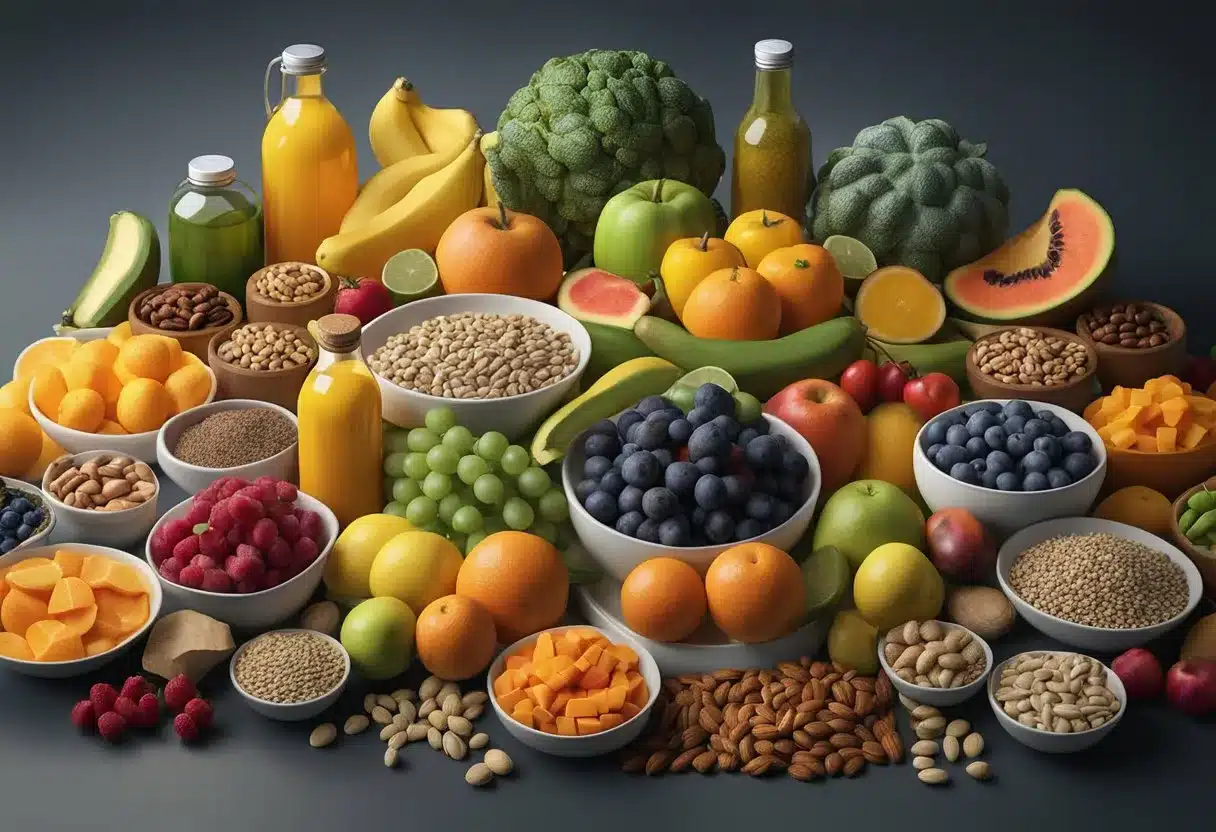
When adopting a vegan diet, it’s crucial to consider essential nutrients that are less abundant in plant-based sources. Supplementation and carefully selected foods can prevent nutrient deficiencies commonly associated with veganism.
Protein Sources
Plant proteins are vital for muscle repair and enzyme function. Beans, lentils, tofu, tempeh, and seitan are rich in protein and can effectively replace animal-derived sources. Nuts and seeds also contribute to the daily protein intake required for a well-balanced vegan diet.
Iron and Zinc Intake
Iron and zinc are minerals integral to immune function and metabolism. Vegans should focus on legumes, seeds, and nuts for iron and include foods like pumpkin seeds and cashews for zinc. Consuming these with vitamin C-rich foods enhances absorption.
Vitamin B12 and Vitamin D
Vitamin B12 and Vitamin D are critical nutrients that might require supplementation. Plant milks and fortified foods are good sources, while nutritional yeast is popular among vegans for its B12 content. For Vitamin D, sunlight exposure is paramount, and supplements might be necessary, especially in less sunny climates.
Omega-3 and Fatty Acids
Omega-3 fatty acids support heart health and cognitive function. They’re found in chia seeds, walnuts, and flaxseeds. Algal oil, a vegan supplement derived from algae, provides DHA and EPA, forms of omega-3s typically found in fish oil.
Environmental and Ethical Considerations

Adopting a vegan lifestyle extends beyond personal health—it encompasses a sustainable approach to the environment and considers the welfare of animals. The following subsections delve into the environmental benefits and ethical underpinnings of a plant-based diet.
Environmental Impact
Plant-based diets have a significantly lower carbon footprint compared to diets rich in animal products. Animal agriculture is a major contributor to greenhouse gas emissions, deforestation, and water consumption. By choosing plant-based foods, one effectively reduces demand for resources-intensive meat and dairy production. Research indicates that plant-based diets can help alleviate environmental strain by decreasing the levels of pollution and land use associated with livestock farming.
Ethical Aspects
The ethical considerations of a vegan diet often focus on animal welfare. Many choose a vegan lifestyle to avoid contributing to systems that involve animal suffering. Ethical vegans believe that all creatures have a right to life and freedom. Consequently, they abstain from consuming animal products, highlighting the moral implications of such consumption. Advocacy for veganism and animal rights underscores the importance of ethical choices in minimizing harm to sentient beings.
Practical Guidance for Adopting a Vegan Lifestyle

When beginning a vegan journey, it’s essential to have a strategic approach to meal planning, shopping, and cooking. Navigating social settings and addressing potential challenges with informed choices ensures a smoother transition to a vegan diet.
Meal Planning and Grocery Shopping
For those new to a vegan diet, it’s important to prioritize a variety of fruits, vegetables, whole grains, beans, and rice. Soy products and nutritional yeast can serve as key staples for protein and B-vitamins respectively. One might start by creating a weekly meal plan that incorporates plant-based recipes, ensuring a balanced intake of nutrients.
- Grocery List Example:
- Fruits: Apples, bananas, berries
- Vegetables: Spinach, broccoli, bell peppers
- Whole Grains: Quinoa, oats, whole wheat pasta
- Protein: Tofu, lentils, chickpeas
- Non-Dairy: Almond milk, vegan yogurt
Cooking and Meal Preparation
Building a vegan-friendly kitchen includes stocking up on essentials for cooking plant-based meals. Experimenting with different beans in recipes or utilizing rice as a base for stir-fries and bowls can be both nourishing and satisfying. Substitutions like flaxseeds for eggs in baking or almond milk for dairy milk in recipes can be straightforward swaps.
Eating Out and Social Events
Dining at a restaurant or attending social eating events requires some planning for those on a vegan diet. Reviewing menus in advance or suggesting eateries with vegan options can alleviate stress. Explaining one’s dietary preferences to hosts and peers helps to manage peer pressure and clear any misconceptions about veganism.
Overcoming Challenges
Anyone transitioning to a vegan lifestyle may face hurdles such as giving up meat, dairy, eggs, fish, honey, and gelatin. Consulting a dietitian can provide guidance on ensuring nutritional adequacy. Education about the health benefits and ethical reasons behind a vegan diet can reinforce one’s commitment and ease the transition.
Transitioning to Veganism
Taking gradual steps towards eliminating animal products can be effective. Starting by removing red meat, then poultry and fish, followed by dairy and eggs, allows for a less abrupt dietary shift. Incorporating more plant-based meals weekly and experimenting with vegan versions of favorite dishes can support the change.
Remember, adopting a vegan lifestyle doesn’t happen overnight. It involves learning, adapting, and exploring new foods that complement your health goals and ethical values.
Considering Health at Different Life Stages
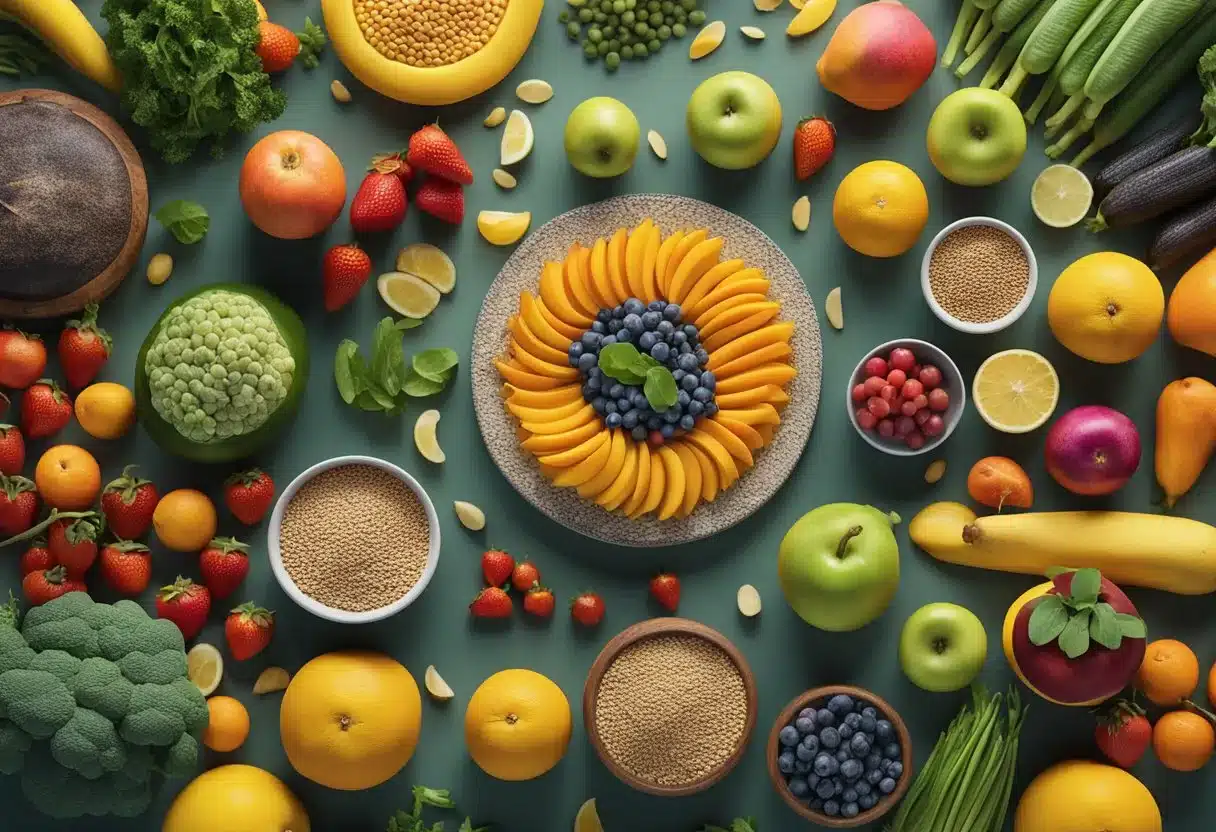
When adopting a vegan diet, it’s important to consider nutritional needs at various life stages to maintain health and support development. Each stage—from childhood to old age—requires careful planning to ensure adequate intake of essential nutrients.
Children and Adolescents
Children and adolescents are in a critical period of growth and development, necessitating a well-planned diet to support their physical and cognitive needs. They require sufficient calories, protein, calcium, iron, and vitamin D for strong bones, muscle development, and overall growth. Parents and caregivers should include a variety of plant-based protein sources such as lentils, chickpeas, and tofu, and calcium-fortified plant milks to meet these needs.
Pregnancy and Breastfeeding
During pregnancy and breastfeeding, maternal health and baby’s development hinge on a diet rich in nutrients like folate, iron, calcium, and vitamin B12. Vegan mothers should focus on consuming fortified foods and consider supplements under medical advice. Including a variety of whole grains, legumes, nuts, seeds, and green leafy vegetables can provide most of these essential nutrients.
Older Adults
Seniors face unique challenges such as a slower metabolism and a higher risk of nutrient deficiencies which can affect their overall lifespan and quality of life. Aging adults should emphasize foods high in fiber, antioxidants, and essential fatty acids to combat inflammation and support heart health. Options such as fortified cereals, walnuts, and flaxseeds are important in a vegan diet for older adults, along with B12 supplementation to counter the common deficiency at this life stage.
Frequently Asked Questions
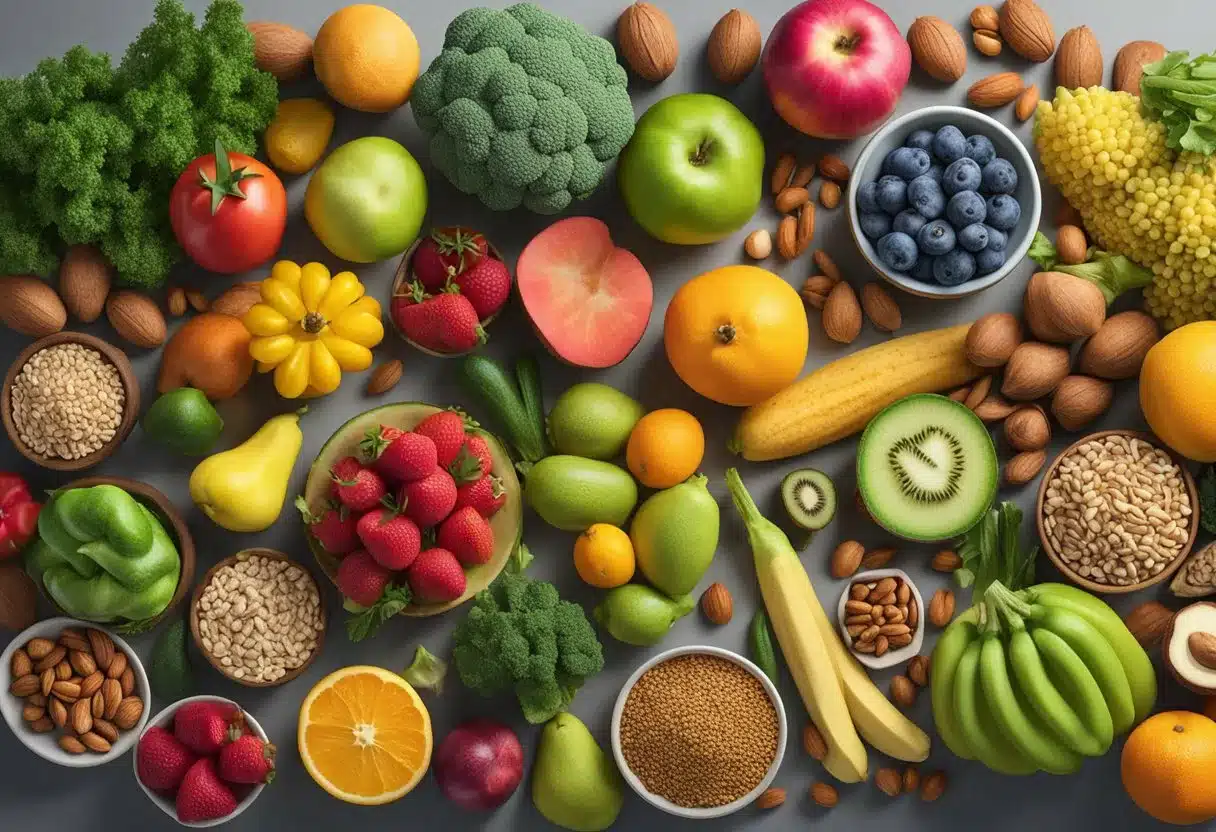
This section answers common inquiries about the health effects of a vegan diet, covering advantages and potential challenges one should be aware of.
What are the potential health benefits of adopting a vegan diet?
Adopting a vegan diet can be linked to a lower risk of heart disease, diabetes, and certain types of cancer. It provides numerous essential nutrients as it includes a variety of fruits, vegetables, whole grains, nuts, seeds, and legumes.
How can a vegan diet influence weight management?
A vegan diet may help in weight management due to its emphasis on high-fiber foods, which can lead to a feeling of fullness and a reduced overall caloric intake. Many individuals find that transitioning to a vegan diet aids in weight loss.
What are the skin health benefits associated with a vegan diet?
A diet high in fruits and vegetables, which are rich in antioxidants and vitamins, may benefit the skin. A vegan diet can improve skin health by providing hydration and potentially reducing acne due to the absence of dairy products.
What are some long-term health implications of maintaining a vegan lifestyle?
Over the long term, a vegan lifestyle can contribute to reduced risk factors for chronic diseases and may promote a longer lifespan. It often encourages a lower intake of saturated fats and higher consumption of nutrient-rich foods that support overall health.
What are the potential risks associated with adopting a vegan diet?
Potential risks might include nutrient deficiencies such as vitamin B12, iron, calcium, and omega-3 fatty acids. These are typically found in animal products and must be sourced differently on a vegan diet.
How does transitioning to a vegan diet affect the body initially?
Initially, one might experience changes in energy levels, digestion, and even mood as the body adapts to a new diet. Transitioning to a vegan diet should be done with consideration to nutrient intake to avoid transient nutrient gaps.